Student Projects
PhD Theses
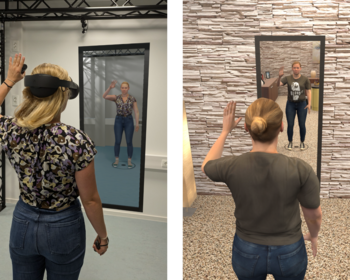
Virtual and Augmented Reality as Tools for Body Perception Research and Therapy
Marie Fiedler
My doctoral research examines how virtual reality and augmented reality shape body perception, especially body-weight perception, and applies these insights to intervention design for anorexia nervosa therapy. I run controlled studies that vary avatar self-similarity, agency, embodiment strength, latency, and the use of augmented versus fully virtual settings to model their effects on perceived body weight, self-identification, and body ownership.
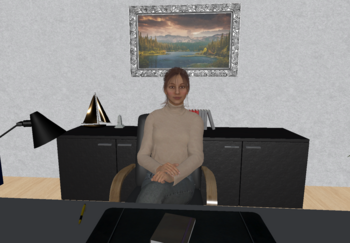
The deployment of Embodied AI and VR in Mental Health Care
Paula Friedrich
My doctoral research explores the use of virtual reality and embodied AI for the treatment of mental health disorders. Especially, the effects of ethical principles and human-centered design are the focus of this research effort. Within controlled studies, we examine self-disclosure and trust towards the embodied conversational agent, the monitoring of physiological measures during the interaction and the overall effectiveness of our applications.
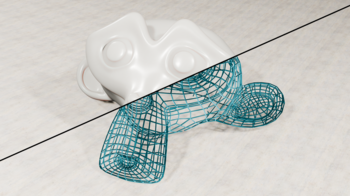
Psychological Ownership of Virtual Objects in Virtual and Extended Reality
Jana Krauss
Humans often feel ownership for physical objects, even if they do not legally belong to them. But since the digital world has taken a hold of our lives, we also have taken a hold (and ownership) of digital and virtual objects. My thesis aims to explore how the "offline" concept of Psychological Ownership presents itself in VR and XR, if (spoiler: yes) and how we develop ownership of virtual objects and what effects these feelings of ownership have on our self, our actions and how we interact with the virtual world.

Embodiment, Harassment, and Avatar Design in Social VR
Jonathan Tschanter
Harassment in social VR can be a deeply distressing experience, intensified by the immersive sense of presence and embodiment. This doctoral research examines how embodiment and avatar design influence both the likelihood and the impact of harassment — and how harassment, in turn, reshapes users’ identification with and experience of their avatars. By combining observations in social VR communities with controlled experimental studies, the project investigates how factors such as realism, personalization, anonymity, and identity cues affect vulnerability, coping, and social interaction. The ultimate goal is to develop evidence-based design strategies that reduce harm and support safer, more inclusive, and empowering social VR environments.
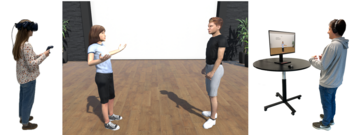
Cross-Device Social Interaction in Virtual Environments
Christian Merz
This dissertation investigates the impact of different devices on key factors such as self- and other-perception in social virtual interactions. Specifically, it examines how varying device configurations influence collaboration in virtual environments, with a focus on ensuring high accessibility and supporting various devices. The goal is to answer the question of whether social virtual interactions remain effective when users with different device configurations engage with one another.
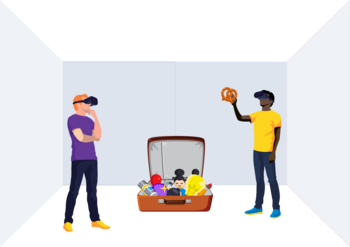
Intercultural Competence and Sensitivity through Social VR
Rebecca Hein
How should social VR applications be designed to support and promote intercultural and transcultural competencies and sensitivity? This work will contribute to the evaluation of how different immersive features of (social) VR affect inter- and transcultural competence and sensitivity. Different approaches will be investigated. Does the representation of the virtual environment or the embodiments of peers influence facets of intercultural competence, such as acceptance of stereotypes or tolerance for ambiguity? Can implicit stereotypical behaviors be deduced with the help of virtual objects?
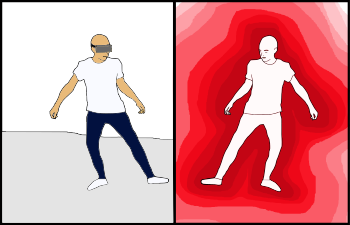
Experiencing the Physical Body in Virtual Environments
Nina Döllinger
The aim of my work is to create a basis for the question whether virtual reality (VR) and virtual embodiment can be a suitable medium to treat disturbances of sensory body awareness. This involves a series of investigations that examine (a) how and to what extend VR can draw attention towards the physical body compared to non-VR methods and (b) the relation between body awareness and the illusion of virtual body ownership.

Image Schema in the Design Process of Data Physicalisations
Cordula Baur
By research through design, I’m going to explore use and effect of Image Schema in the field of Data Physicalisation. In an iterative design research process I’m going to create design artefacts and evaluate them by qualitative methods, in order to develop an Image Schema based toolkit to support the design process of Data Physicalisation.

The Effects of Virtual Self-Representations on the Perception of Body Dimensions in Virtual Environments
Erik Wolf
This doctoral thesis mainly addresses the questions of how body dimensions of virtual representations are perceived in virtual environments and by which factors they are influenced. It investigates how exposure to virtual self-representations in virtual environments can change the perception of one's own body and how sustainable this effect is.
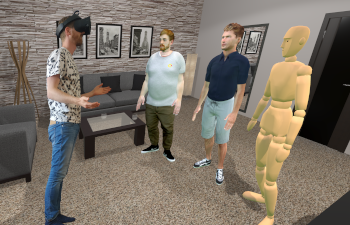
The Impact of Virtual Social Interactions on an Embodied Individual’s Self-perception in Extended Reality Environments
David Mal
In virtual social interactions, embodied users' virtual representations, so-called avatars, can have different characteristics of appearance and presented behavior. This doctoral thesis aims to investigate the impact of the attributes of virtual others' avatars, with whom one has social contact in XR environments, on a user's perceived quality of communication, and possibly also his/her self-perception.
Collaborative Manual Tasks in Distributed Virtual Environments
Sebastian Keppler
Today's virtual environments offer only limited sensory modalities, especially for collaborative manual tasks this can become a complex challenge for participants involved. This thesis deals with the development and analysis of sensor substitution techniques to increase usability and UX in collaborative tasks within a distributed virtual environment.
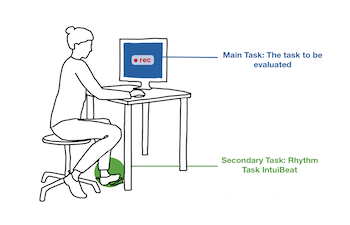
IntuiBeat: Formative and Summative Evaluation of Intuitive Use
Daniel Reinhardt
In this work, intuitive use is defined as the extent to which a product can be used in a mentally efficient and effective manner, which is accompanied by a strong metacognitive feeling of fluency. Since available methods for the formative and summative evaluation of intuitive use lack sufficiently high time efficiency, this work proposes two new rhythm based evaluation methods for intuitive use using the secondary task paradigm: 1) IntuiBeat-F as a formative method and 2) IntuiBeat-S as a summative method.
Master Theses
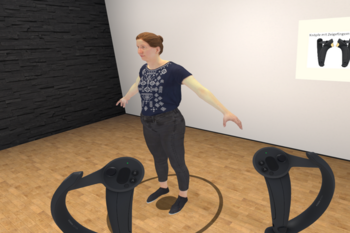
See Yourself at Your Best: The Impact of Embodying Personalized Photorealistic Avatars with Enhanced Attractiveness through Ideal Body Weight on Self-Esteem and Body Perception in Virtual Reality
Lena Holderrieth
The aim of this project is to explore whether embodying an avatar with increased attractiveness influences self-esteem. To increase the avatar's attractiveness, the participants can modify the body weight of their avatar to match their ideal body weight. We implement a mirror exposure in virtual reality, where participants will embody personalized photorealistic avatars configured to their self-defined ideal body weight.

The Effects of AI Transparency and Data Autonomy on Trust and Self-Disclosure in an AI-controlled Therapeutic Conversation
Paula Friedrich
Due to the large amount of people suffering from mental disorders worldwide, the deployment of Virtual Reality (VR) and Artificial Intelligence (AI) in a therapeutic context are being researched. This master thesis aims to assess the impact of increased transparency regarding the AI's function and provided autonomy regarding the data collection on the perceived trust towards the AI therapist as well as the level of self-disclosure during the interaction.
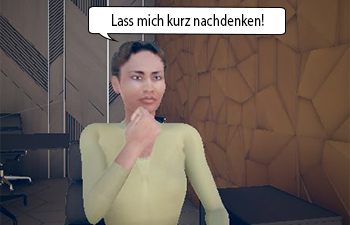
Conversational Fillers to Bridge Response Latency in Human-AI Interaction
Niko Bender
While it is possible to talk to conversational AI systems in an embodied form (e.g., as Virtual Agents), various dependencies on different software and servers can lead to considerable latency in the AI responding to the user. This master thesis uses an embodied artificial intelligence to explore the effects of anthropomorph fillers on the perceived waiting time during pauses in Human-AI interactions and on the perceived trustworthiness of the AI.
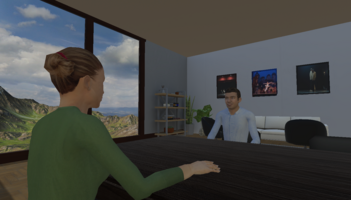
A Virtual Reality Training Platform for Negotiation Skills
Tana Glemser
Professional negotiations can have a significant impact on one's personal future, and a lack of negotiation skills can negatively influence salary and contract conditions. Virtual Reality (VR) training with embodied intelligent agents as negotiation partners can improve negotiation skills. Based on a professional negotiation scenario, the developed VR application can be used to train negotiation skills, as well as research aspects of human-agent interaction.

Development of an Empathy-driven Cyberbullying Prevention in VR
Viktoria Horn
Empathy, especially affective Empathy, is known to be an effective inhibitor of cyberbullying actions. Therefore this thesis elaborates how to foster Empathy in the context mentioned using Virtual Reality as a medium and Personal Space Invasions as a stylistic mean to transport the feeling of Cybervictims.

Navigation Concepts for Augmented Reality
Sebastian Slowik
From day to day navigation tasks become more complicated and stressful. One promising technology supporting driver safety and providing good user experience is augmented reality. This thesis develops and evaluates innovative augmented reality concepts for navigation tasks.

Multi-Device Assembly Instructions
Jonathan Stapf
Does a crossmedial assembly assistance system - combining smart glasses and tablet computer - facilitate procedural instructions for a manual bike part assembly? A prototype system was built and evaluated to examine synergy effects of the devices.
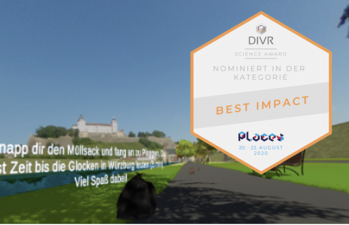
Change by Virtual Reality (VR)
Rebecca Hein
Immersive technologies offer effective facilitators for effective and sustainable behavioral change - an example: "I feel that I can do it in VR, so I can do it in reality" (high feeling of effectiveness and control). VR can, for instance, be used as a new and innovative intervention to reduce the attitude-behavior gap. By altering the perspective and/or the interactivity, the individual feeling of effectiveness and thus the individual environmental behavior should be strengthened.
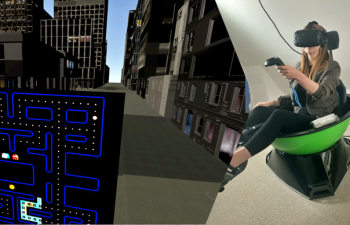
Concept for Reducing Motion Sickness in Future Autonomous Vehicles when Using Virtual Reality
Anna-Lena Hahn
In the future, autonomous vehicles will enable motorists to no longer have to concentrate on traffic. As passengers, former car drivers will be able to use their time while driving for other purposes, such as the consumption of media content. This thesis deals with the possible application of technologies and methods from the research area of virtual reality (VR) in an autonomous driving vehicle.

An Immersive Carbon Footprint Calculator
Stephanie Vogt
In this thesis an interactive carbon footprint calculator is developed, which gives users immersive feedback about their carbon dioxide emission. Besides calculating the individual carbon footprint, changes for future pro-environmental actions are designed.
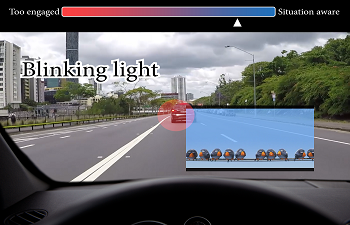
Attention A.I. - For a Better and Safer Experience in Automated Driving
Jens To
Attention A.I. helps to manage drivers’ attention between the joyful experience of watching a video on a head-up display and the safety of monitoring the driving environment in automated vehicles. The system predicts when drivers are likely to switch their attention due to events outside of the vehicle by using machine learning and compares them with the actual behaviour to decide if an intervention is necessary.
Bachelor Theses
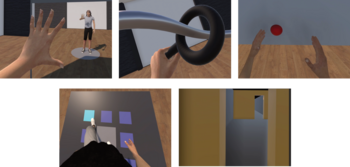
Less Hardware, Same Experience? How Reduced Hardwarechanges the Presence and Sense of Embodiment Experience in Full-Body VR
David Tschanter
The project investigates how full-body VR systems influence presence and sense of embodiment, central components for a convincing immersion in virtual worlds. To this end, a minimal hardware-based system (Meta Movement) and a marker-based outside-in system (HTC Vive) are systematically compared in order to evaluate the effect of the system on user experience and performance. The aim is to clarify the extent to which the reduction in VR hardware affects presence and sense of embodiment and which solution offers the best balance between quality of experience, costs and setup for practical contexts such as education or therapy.

Yours in the Virtual World: Developing a Scenario-Based Questionnaire to Measure the Emergence of Psychological Ownership of Virtual Objects
Marcel Mozet
This thesis presents the first version of a questionnaire on psychological ownership (for virtual objects). Although several questionnaires on psychological ownership already exist, they are often tailored to specific scenarios and ignore the fundamental routes that, according to theory, are necessary for developing psychological ownership. The questionnaire was validated with approximately 80 people and already shows good internal consistency, and the subscales based on the routes also appear to have been chosen appropriately. The contribution of the questionnaire lies particularly in its proximity to theory and its general adaptability to a wide variety of scenarios.

The effect of personalized vs. generic avatars on the experience of psychological ownership in virtual reality
Nicolas Hess
The thesis explores whether and how the embodiment of a person (i.e., one's own representation in VR through a virtual body or avatar) affects the development of psychological ownership of virtual objects. Psychological ownership refers to the claim of ownership that people can develop toward objects or concepts. In this project, special attention is paid to the effect of avatar personalization based on psychological ownership theory, personalized embodiment could enhance the effect. To this end, we are conducting a study in which participants perform a task with a virtual object that is designed to generate ownership of the object.
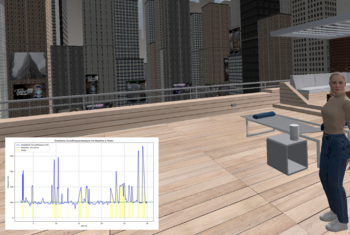
Development of a Modular Speech Analysis Tool for Real-Time Adaptation of a Virtual Therapist
Jan Goldmann
What if a virtual therapist could instantly respond to a patient’s emotional state based on voice cues? This project builds a modular speech analysis tool that captures fundamental frequency (F₀) in real time, enabling a dynamic adaptation of the virtual therapist’s behavior in Virtual Reality Exposure Therapy (VRET). By integrating these vocal insights into an AI-driven environment, therapy sessions become more personalized, empathetic, and potentially more effective.
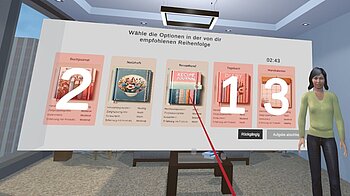
The Impact of Illusion of Control on Trust towards Embodied AI
Moritz Gahm, Friederike Hemesath, Konstantin van Rinsum
As artificial intelligence (AI)-driven virtual agents become more common in work environments, trust is key to user acceptance. But what if users only think they have control? This thesis explores how the Illusion of Control (IoC) affects trust in AI agents within virtual reality (VR). We examine whether static placebo settings, interactive configuration, combining illusion with actual control, and repeated control interactions enhance trust. Findings will provide insights into perceived control in AI trust and the ethical balance between empowerment and deception.
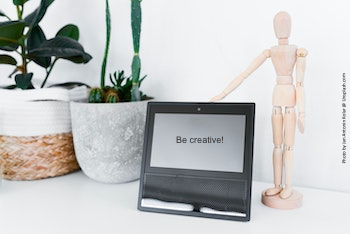
Creative Problem-Solving in the Presence of Voice Assistants
Imen Mguedmini
Wouldn't you like to be able to ask for guidance when facing a complex problem or when the solution is not obvious? Powerful AI and a voice-based natural language interface could one day make this a reality. This thesis investigates if the presence of a smart speaker causes an observer effect (i.e. social facilitation | inhibition effect) and if such an effect extends to creative problem-solving.

Mood Regulation Chatbot
Adrian Bucka
The bachelor thesis evaluates different coping and mood regulation strategies presented by a conversational agent (built with BOTfriends X). It investigates the impact of the agent's characteristics and personality traits on change behavior while giving the users advice on coping with the challenging times of the ongoing covid-19 pandemic.
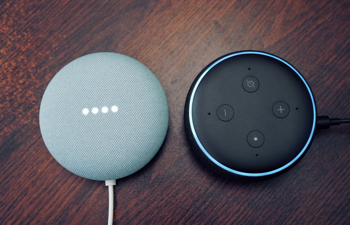
Non-Expert’s Mental Models about Smart Speakers and How to Address their Shortcomings
Christopher Voit
Recent research suggests that non-experts have incomplete mental models about smart speakers which can lead to privacy and security threats. Addressing their shortcomings using a competence learning program might support users in their decision-making process regarding privacy and data sovereignty.

Increasing the Perceived Credibility of 360°- Journalism
Gregor Winkler
Source credibility is an important part of every journalistic report. The MAIN-Model of Sundar (2008) proposes that credibility can be enhanced by increasing different affordances like agency or interactivity. In this work interactive elements, like info-hotspots, were added to a journalistic 360° video with the goal to create a more credible contribution.
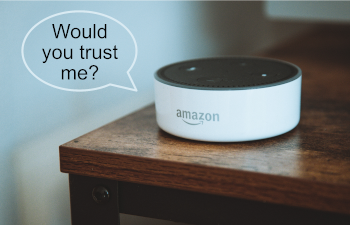
Trust in Speech Assistants
Clemens Reitelbach
Special trust in such systems is required for the retrieval of personal data such as illnesses by voice assistants. In cooperation with the startup vuemondo, the project aims to find out how language assistants need to be designed to inspire this trust.

Social Interaction with Robots
Muriel Helbig
In this thesis, the social interaction with robots in an industrial context is investigated under consideration of the media equation, whereby the influence and the emergence of "social presence" are particularly relevant. The impact of social interaction on employee productivity and work climate is also considered.
HCI Project
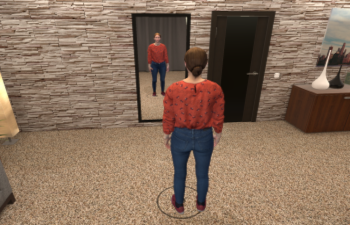
Exploring the Impact of Embodying Personalized Avatars With Idealized Body Weight on Self-Esteem and Body Perception in Virtual Reality
Lena Holderrieth
The aim of this project is to explore whether embodying an avatar with increased attractiveness influences self-esteem. To increase the avatar's attractiveness, the participants can modify the body weight of their avatar to match their ideal. We implement a mirror exposure in virtual reality (VR), where participants will embody personalized photorealistic avatars configured to their self-defined ideal body weight.
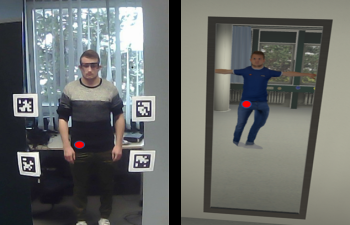
Analysis of Gaze Behaviour during a Visual Body Awareness Task
Christopher Göttfert
This project investigates the comparability of eye-tracking data in the real world, as well as in virtual reality in the context of visual body perception. Highlighting the differences in gaze behavior between both fields is important for the use of eye-tracking in future virtual reality applications.
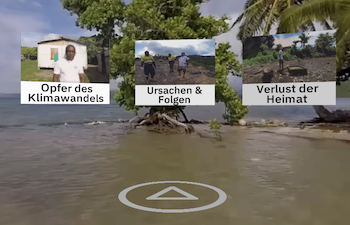
Effects of Interactivity on the Reception of 360° Journalism
Viktoria Horn
Research goal of this project is to examine whether the extension of interactivity in a 360 degree video has a positive effect on credibility, story recall and story sharing intention. Interactive Elements such as info hotspots and scene switch buttons were designed following the MAIN Model by Sundar (2008), which proposes a heuristic approach of understanding credibility of digital media.


